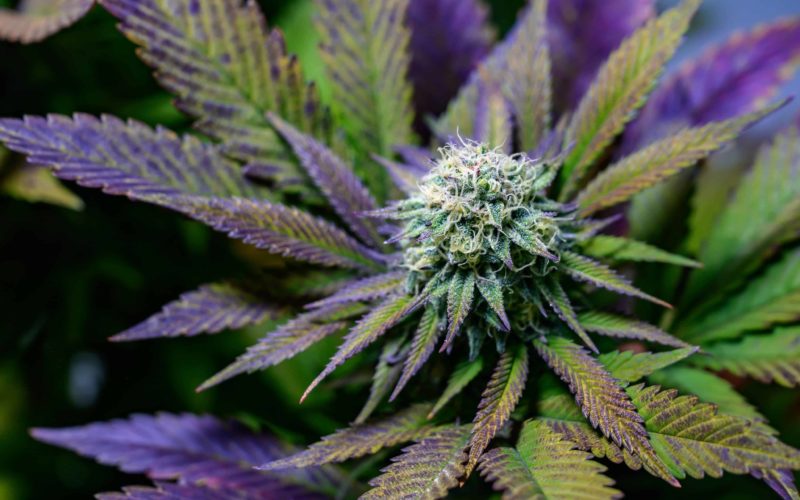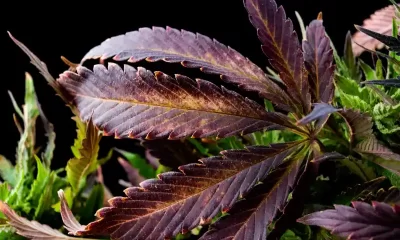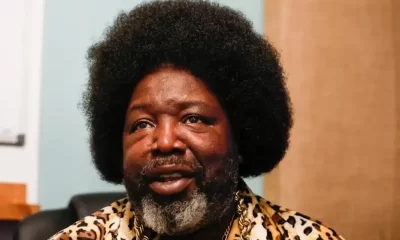Laws
NBA’s Montrezl Harrell Has Felony Weed Charge Reduced to Misdemeanor

NBA forward Montrezl Harrell pleaded guilty to a single count of misdemeanor marijuana possession on Wednesday, avoiding felony charges in the case that began with a traffic stop in Kentucky earlier this year.
Former Charlotte Hornets forward Montrezl Harrell pleaded guilty to a single count of misdemeanor marijuana possession on Wednesday, avoiding felony charges in the case that began with a traffic stop in Kentucky. Under the terms of the plea deal, Harrell was given a 30-day conditional jail term, probated for 12 months. If he completes his year-long probation without further legal trouble, he will not have to spend the 30-day sentence behind bars, Yahoo Sports writer and NBA analyst Chris Haynes revealed in a tweet on Wednesday.
Harrell became an NBA free agent earlier this year after finishing the 2021-2022 basketball season with the Charlotte Hornets. With the fate of the Kentucky marijuana charge now settled, he becomes a prospect of interest for several teams in the league, which were less likely to sign the veteran player while he was in legal peril.
Harrell Arrested in Kentucky in May
Harrell was pulled over by a state trooper for following too closely behind the vehicle in front of him on the morning of May 12 while he was driving a rented 2020 Honda Pilot southbound on I-75. In a police report cited by the Charlotte Observer, Trooper Jesse Owens wrote that after stopping Harrell’s vehicle in Madison County, Kentucky, he “observed” the odor of marijuana.
The citation also alleged that Harrell “admitted to being in possession of marijuana and produced a small amount from his sweatpants.” Law enforcement officers then searched the vehicle Harrell was driving. During the search, the trooper discovered “three pounds of marijuana in vacuum sealed bags” in a backpack that was found on the back seat of the vehicle, according to the traffic citation.
Harrell was originally charged with trafficking less than five pounds of marijuana. Under Kentucky state law, possession of more than eight ounces but less than five pounds of marijuana is classified as a Class D felony for the first offense. Those convicted of the charge are subject to a sentence of one to five years behind bars and a fine ranging from $1,000 to $10,000. A judge in Richmond, Kentucky approved amended charges in the case on Wednesday, resulting in Harrell’s guilty plea to misdemeanor marijuana possession and the suspended sentence and probation.
8-Year NBA Veteran
Harrell, a native of North Carolina, played eight seasons with the NBA, becoming a free agent at the end of last season. He played NCAA Division 1 college basketball for the University of Louisville Cardinals in Kentucky, where he averaged 11.6 points, 6.9 rebounds and 1.1 blocked shots per game. As a freshman, he played on the Cardinals’ 2013 national championship team, although the NCAA later stripped the title from the team title for violations of league rules.
Harrell was chosen by the Houston Rockets in the second round of the 2015 NBA draft, the league’s 32nd pick overall that year. On September 19, 2015, he signed a three-year contract with the Rockets and made his NBA debut with the team in the opening game of the season against the Denver Nuggets, scoring eight points and pulling down three rebounds. During his rookie season, he was assigned to the Rockets D-league affiliate the Rio Valley Grande Vipers several times.
In June 2017, the Los Angeles Clippers traded Chris Paul to the Rockets, acquiring Harrell, Patrick Beverley, Sam Dekker, Darrun Hilliard, DeAndre Liggins, Lou Williams, Kyle Wiltjer and a 2018 Houston first-round draft pick in the transaction. In September 2020, Harrell was named the NBA Sixth Man of the Year, an award given by the league for the season’s best bench player. That season, the Clippers went to the playoffs, losing in seven games against the Nuggets. Harrell averaged 10.5 points and 2.9 rebounds per game in the playoffs which saw the Nuggets advance after starting the series down three games to one.
Harrell signed with the Los Angeles Lakers on November 22, 2020, making his debut with the team the following month and logging 17 points, 10 rebounds and three assists against the Los Angeles Clippers, his former team and Lakers’ crosstown rival. In August 2021, Harrell was traded to the Washington Wizards as part of a deal for point guard Russell Westbrook. In February 2022, he was traded to the Charlotte Hornets, scoring 15 points and six rebounds in his team debut on February 11. He became a free agent at the end of the 2021-2022 season.
Source: https://hightimes.com/news/nbas-montrezl-harrell-has-felony-weed-charge-reduced-to-misdemeanor/
Business
New Mexico cannabis operator fined, loses license for alleged BioTrack fraud

New Mexico regulators fined a cannabis operator nearly $300,000 and revoked its license after the company allegedly created fake reports in the state’s traceability software.
The New Mexico Cannabis Control Division (CCD) accused marijuana manufacturer and retailer Golden Roots of 11 violations, according to Albuquerque Business First.
Golden Roots operates the The Cannabis Revolution Dispensary.
The majority of the violations are related to the Albuquerque company’s improper use of BioTrack, which has been New Mexico’s track-and-trace vendor since 2015.
The CCD alleges Golden Roots reported marijuana production only two months after it had received its vertically integrated license, according to Albuquerque Business First.
Because cannabis takes longer than two months to be cultivated, the CCD was suspicious of the report.
After inspecting the company’s premises, the CCD alleged Golden Roots reported cultivation, transportation and sales in BioTrack but wasn’t able to provide officers who inspected the site evidence that the operator was cultivating cannabis.
In April, the CCD revoked Golden Roots’ license and issued a $10,000 fine, according to the news outlet.
The company requested a hearing, which the regulator scheduled for Sept. 1.
At the hearing, the CCD testified that the company’s dried-cannabis weights in BioTrack were suspicious because they didn’t seem to accurately reflect how much weight marijuana loses as it dries.
Company employees also poorly accounted for why they were making adjustments in the system of up to 24 pounds of cannabis, making comments such as “bad” or “mistake” in the software, Albuquerque Business First reported.
Golden Roots was fined $298,972.05 – the amount regulators allege the company made selling products that weren’t properly accounted for in BioTrack.
The CCD has been cracking down on cannabis operators accused of selling products procured from out-of-state or not grown legally:
- Regulators alleged in August that Albuquerque dispensary Sawmill Sweet Leaf sold out-of-state products and didn’t have a license for extraction.
- Paradise Exotics Distro lost its license in July after regulators alleged the company sold products made in California.
Golden Roots was the first alleged rulebreaker in New Mexico to be asked to pay a large fine.
Source: https://mjbizdaily.com/new-mexico-cannabis-operator-fined-loses-license-for-alleged-biotrack-fraud/
Business
Marijuana companies suing US attorney general in federal prohibition challenge

Four marijuana companies, including a multistate operator, have filed a lawsuit against U.S. Attorney General Merrick Garland in which they allege the federal MJ prohibition under the Controlled Substances Act is no longer constitutional.
According to the complaint, filed Thursday in U.S. District Court in Massachusetts, retailer Canna Provisions, Treevit delivery service CEO Gyasi Sellers, cultivator Wiseacre Farm and MSO Verano Holdings Corp. are all harmed by “the federal government’s unconstitutional ban on cultivating, manufacturing, distributing, or possessing intrastate marijuana.”
Verano is headquartered in Chicago but has operations in Massachusetts; the other three operators are based in Massachusetts.
The lawsuit seeks a ruling that the “Controlled Substances Act is unconstitutional as applied to the intrastate cultivation, manufacture, possession, and distribution of marijuana pursuant to state law.”
The companies want the case to go before the U.S. Supreme Court.
They hired prominent law firm Boies Schiller Flexner to represent them.
The New York-based firm’s principal is David Boies, whose former clients include Microsoft, former presidential candidate Al Gore and Elizabeth Holmes’ disgraced startup Theranos.
Similar challenges to the federal Controlled Substances Act (CSA) have failed.
One such challenge led to a landmark Supreme Court decision in 2005.
In Gonzalez vs. Raich, the highest court in the United States ruled in a 6-3 decision that the commerce clause of the U.S. Constitution gave Congress the power to outlaw marijuana federally, even though state laws allow the cultivation and sale of cannabis.
In the 18 years since that ruling, 23 states and the District of Columbia have legalized adult-use marijuana and the federal government has allowed a multibillion-dollar cannabis industry to thrive.
Since both Congress and the U.S. Department of Justice, currently headed by Garland, have declined to intervene in state-licensed marijuana markets, the key facts that led to the Supreme Court’s 2005 ruling “no longer apply,” Boies said in a statement Thursday.
“The Supreme Court has since made clear that the federal government lacks the authority to regulate purely intrastate commerce,” Boies said.
“Moreover, the facts on which those precedents are based are no longer true.”
Verano President Darren Weiss said in a statement the company is “prepared to bring this case all the way to the Supreme Court in order to align federal law with how Congress has acted for years.”
While the Biden administration’s push to reschedule marijuana would help solve marijuana operators’ federal tax woes, neither rescheduling nor modest Congressional reforms such as the SAFER Banking Act “solve the fundamental issue,” Weiss added.
“The application of the CSA to lawful state-run cannabis business is an unconstitutional overreach on state sovereignty that has led to decades of harm, failed businesses, lost jobs, and unsafe working conditions.”
Business
Pot Odor Does Not Justify Probable Cause for Vehicle Searches, Minnesota Court Affirms

The Minnesota Supreme Court affirmed that cannabis odor does not constitute probable cause to search a vehicle.
If Minnesota police search a vehicle solely based upon the smell of pot, they can’t justify searching a vehicle, even if there is evidence found of other alleged crimes. Even after appealing a lower court decision to suppress the evidence—twice—the Minnesota Supreme Court agreed, and the dismissal of his charges stands.
In a ruling filed regarding a case the State of Minnesota Court of Appeals on Sept. 13, the Minnesota Supreme Court affirmed that cannabis odor does not constitute probable cause to search a vehicle.
The case has been ongoing for two years. On July 5, 2021, just before 10 p.m., a Litchfield police officer stopped a car for an obscure local law: the light bar mounted on the vehicle’s grill had more auxiliary driving lights than are permitted under Minnesota law. The officer asked the driver, Adam Lloyd Torgerson, for his license and registration. Torgerson, his wife, and his child were present in the vehicle. The officer stated that he smelled pot and asked Torgerson if there was any reason for the odor, which he initially denied. But cops found a lot more than just pot.
A backup officer was called in. The couple denied possessing any pot, but Torgerson admitted to smoking weed in the past. The second officer stated that the weed odor gave them probable cause to search the vehicle and ordered them to exit the vehicle. The first officer searched the vehicle and found a film canister, three pipes, and a small plastic bag in the center console. The plastic bag contained a white powder and the film canister contained meth, which was confirmed in a field test.
Torgenson was charged with possession of meth pipe in the presence of a minor and fifth-degree possession of a controlled substance after the unwarranted search of Torgerson’s vehicle.
Police Aren’t Allowed to Do That, Multiple Courts Rule
But the search had one major problem—cops weren’t searching for a meth pipe. They only searched his car because they could smell pot, and the meth and paraphernalia were a surprise for everyone. Still, they had no grounds to search the vehicle. The man’s charges were later dismissed after the district court determined the odor of cannabis alone was insufficient basis for probable cause to search the vehicle, regardless of whatever other drug paraphernalia they found.
The state appealed the case, but the Minnesota Court of Appeals affirmed the district court’s decision. The case was appealed a second time, this time to the Minnesota Supreme Court, which agreed with the lower court’s ruling.
“This search was justified only by the odor of marijuana emanating from the vehicle,” the Minnesota Supreme Court decision reads. “Torgerson moved to suppress the evidence found during the search, arguing that the odor of marijuana, alone, is insufficient to create the requisite probable cause to search a vehicle under the automobile exception to the warrant requirement. The district court granted Torgerson’s motion, suppressed the evidence, and dismissed the complaint. The State appealed. The court of appeals affirmed the district court’s suppression order. Because we conclude that the odor of marijuana emanating from a vehicle, alone, is insufficient to create the requisite probable cause to search a vehicle under the automobile exception to the warrant requirement, we affirm.”
It amounts to basic human rights that apply—regardless of whether or not a person is addicted to drugs.
Other States do Precisely the Same Regarding Pot Odor as Probably Cause
An Illinois judge ruled in 2021 that the odor of cannabis is not sufficient grounds for police to search a vehicle without a warrant during a traffic stop.
Daniel J. Dalton, Associate Judge of the 14th Judicial Circuit, issued a ruling in response to a motion to suppress evidence in the case of Vincent Molina, a medical cannabis patient arrested for cannabis possession last year.
In that case, Molina was arrested despite the decriminalization of small amounts of cannabis in Illinois in 2019 with the passage of the Illinois Cannabis Regulation and Tax Act.
In some states, the issue of probable cause and cannabis was defined through bills.
Last April, the Maryland House of Delegates approved a bill that reduces the penalties for public cannabis consumption and bars police from using the odor of cannabis as the basis for the search of an individual or auto. Under Maryland’s House Bill 1071, law enforcement officers would be prohibited from using the odor of raw or burnt cannabis as probable cause to search a person or vehicle.
The rulings represent the rights of citizens when they are pulled over by police, even if there are hard drugs involved.
-

 Business2 years ago
Business2 years agoPot Odor Does Not Justify Probable Cause for Vehicle Searches, Minnesota Court Affirms
-

 Business2 years ago
Business2 years agoNew Mexico cannabis operator fined, loses license for alleged BioTrack fraud
-

 Business2 years ago
Business2 years agoAlabama to make another attempt Dec. 1 to award medical cannabis licenses
-

 Business2 years ago
Business2 years agoWashington State Pays Out $9.4 Million in Refunds Relating to Drug Convictions
-

 Business2 years ago
Business2 years agoMarijuana companies suing US attorney general in federal prohibition challenge
-

 Business2 years ago
Business2 years agoLegal Marijuana Handed A Nothing Burger From NY State
-

 Business2 years ago
Business2 years agoCan Cannabis Help Seasonal Depression
-

 Blogs2 years ago
Blogs2 years agoCannabis Art Is Flourishing On Etsy













